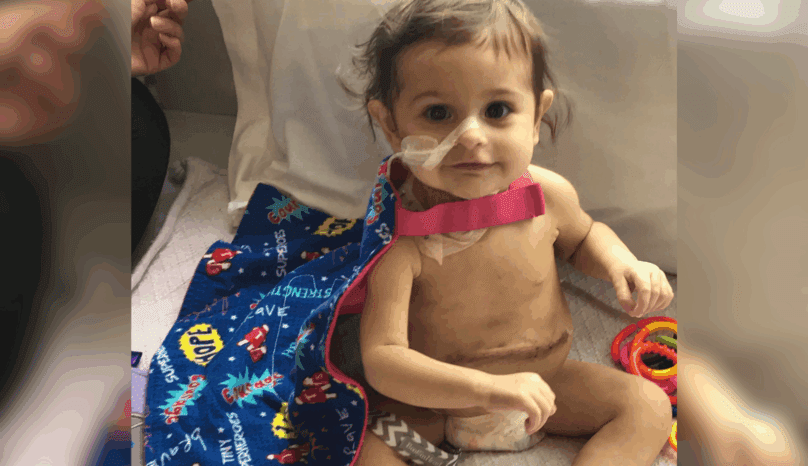Alexis tears up when she recalls the three harrowing months she and her partner spent waiting for a liver transplant for their infant daughter Olivia. “You just hope for that call,” she said. “Every day you hope for that call to come.”
Olivia was diagnosed with biliary atresia when she was seven weeks old, and a few months later was placed on the transplant list. As much as her parents hoped a lifesaving liver would become available for Olivia, her halting weight gain raised concern.
“We wanted her to get big and strong going into the surgery, but at the same time wanted the surgery as soon as possible because she was struggling,” said her father, Nick.
When Olivia was 10 months old, the call finally came in. On April 12, 2018, she received a split liver transplant, meaning that an adult recipient received the donor’s large lobe and Olivia received the small lobe. When asked how she felt about Olivia’s transplant journey, Alexis could not hold back tears. “Gratitude for our donor family doesn’t even cover it. It’s life changing. Thank you is not enough.”
Olivia’s father shared the same sentiment. “There’s now a little kid who has a chance to grow up and have a family and make everybody in her family insanely happy,” Nick said. “She has the chance to one day grow up and do something awesome with her life and be a good role model to her sister.”
Now four, Olivia is living a happy, normal life with her parents and younger sister. “She’s a very strong kid,” said Nick.
Pediatric Organ Transplants Help Kids be Kids Again
National Pediatric Transplant Week takes place during the last full week of National Donate Life Month, celebrated annually in April.
The week provides an opportunity to advocate for one crucially important goal: ending the pediatric transplant waiting list so kids can be kids again.
What makes pediatric transplants different from other organ donations is that children often respond better to child-sized organs. In 2020, more than 1,700 children received life-saving transplants, matched from nearly 900 pediatric organ donors. While the donors ranged in age from newborns to 17, most were between 11 and 17 years old.
Many of the conditions that prompt the need for transplant can occur as early as infancy, including chronic kidney disease, liver disease, cystic fibrosis, biliary atresia, congenital heart disease, pulmonary hypertension, etc. No matter the disease, they typically have one thing in common: they can all be life-threatening without a transplant.
This year, National Pediatric Transplant Week takes place April 23-29. Throughout the week, clinical partners share patient stories, donor families whose children have saved and healed lives through organ, eye and tissue donation are honored; and recipient families share their gratitude and milestone celebrations.
Celebrate National Pediatric Transplant Week and Register as a Donor
Alexis and Nick will never forget the way their lives were changed because of the generosity of a donor hero. “Because someone else was so giving, we have this beautiful and kind 4-year-old. So we’ve always, always felt very blessed, very fortunate and very appreciative,” said Nick.
We hope you’ll be a part of this community during National Donate Life Month and during National Pediatric Transplant week by registering as an organ, eye, and tissue donor. By registering as an organ or tissue donor, you have the chance to leave a legacy of hope, healing and renewal.



